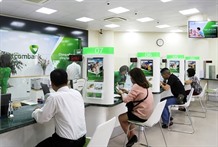Four large State-owned banks this week asked the Government to allow them to either retain their profits or pay dividends in shares rather than cash until 2020 to raise capital, enabling them to meet Basel II standards as required by the central bank.

Vietcombank has asked the Government to increase its foreign holding ratio to support its capital ambitions. — Photo Vietcombank
Four large State-owned banks this week asked the Government to allow them to either retain their profits or pay dividends in shares rather than cash until 2020 to raise capital, enabling them to meet Basel II standards as required by the central bank.
The banks, including BIDV, VietinBank, Agribank and Vietcombank, also asked the Government to increase their foreign ownership limit to help them increase capital.
According to Le Duc Tho, chairman of VietinBank, increasing capital was an urgent task for his bank this year, explaining that failure to do so had adverse impacts on the bank’s business performance last year.
Due to this, the central bank set a low credit growth limit 6 per cent for VietinBank in 2018 so the bank had to cease lending from September. Slow credit growth caused the bank a sharp drop in pre-tax profit to VND6.8 trillion (US$291.85 million) in 2018.
With regards to dividend payments, Thọ asked the Government to permit it to pay dividends by shares instead of cash to raise capital. Cash dividends should only be made unless the bank’s capital adequacy ratio (CAR) meets Basel II standards, he said.
The proposal was also mentioned by Agribank Chairman Trinh Ngoc Khanh who said Agribank had issued bonds worth VND4 trillion to meet the capital demands of agricultural projects – one of the Government’s priority areas.
Besides asking for the Government’s support to help banks increase capital, chairman of BIDV Phan Duc Tu also asked the Government to remove obstacles related to foreign holdings and help it to sell shares to foreign investors.
Despite selling 3 per cent of its capital to Singapore’s GIC and Japan’s Mizuho Bank recently, Vietcombank’s chairman Nghiem Xuan Thanh also asked the Government to increase the foreign ratio limit to support capital growth, saying it was an urgent task.
Thành also asked the Government to allow his bank to retain profits to boost capital.
Analysts at Bao Viet Securities Company (BVSC) said that to meet the Basel II standards by 2020 as planned by the central bank, listed commercial banks must increase capital by VND237 trillion (US$10 billion) in 2018-19 if they wanted permission for credit growth of 14-15 per cent.
However, Le Duc Thuy, former chairman of the National Financial Supervisory Commission, said that capital in banks had increased by only $2 billion over the last two years.
According to experts, banks will be forced to increase capital in 2019 if they don’t want to face a sharp reduction in profits in the wake of the low credit growth quota allocated by the central bank. The central bank issued a warning last year saying it would only grant credit growth quotas for commercial banks depending on their health and capital.
The regulation is aimed to force local banks to meet capital standards according to Basel II – a set of banking standards and principles issued by the Basel Committee on banking supervision to enhance competition and transparency in the banking system and make banks more resistant to market changes.
As most banks still earn profits from credit, experts said banks were in a survival race to increase capital.
Economist Le Xuan Nghia said raising capital would be the hardest pressure for banks in 2019, explaining that only by increasing capital, banks could increase their credit growth quotas to be able to make profits.
Experts said the race to increase capital would be fiercer this year as many banks had failed to do so last year. In early 2018, nearly 20 banks planned to raise capital, but only a few had succeeded by the end of the year. — VNS





